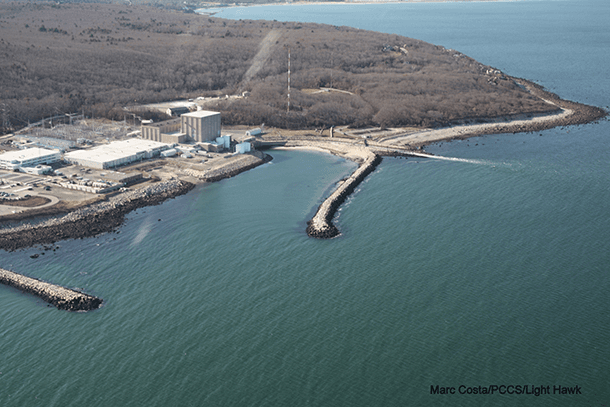Even plans to close nuclear power plants stir controversy
Pilgrim Nuclear Generating Station will be shut down by 2019, but activists remain concerned about the plant’s spent fuel.
Energy companies are finding that making plans to close a nuclear power plant doesn’t end the protests and anger.
In Massachusetts, residents who live near Entergy Corporation’s Pilgrim Generating Station, worry about health and environmental threats from the spent radioactive fuel that remains at the plant once the power plant closes. And they’re not being quiet about it.
“My house is six miles across open water from the reactor,” says Mary Lampert, the director of the citizen group Pilgrim Watch. “I can see it from my house, which is real motivation to get to work on the very serious issues that threaten our communities.”
Lampert says she and her fellow activists celebrated when they heard that Entergy had decided to close the plant, but their joy was short-lived when they learned about the continued presence of radioactive waste.
“The problem doesn’t go away. There’s no place to put that spent fuel. My granddaughter will be my age and it will still be sitting on the shores of Cape Cod Bay, because no state wants to be a permanent repository,” Lampert says.
Lampert and her fellow activists are asking that the spent fuel be removed from storage pools and placed into dry casks on site. She says it’s the best they can hope for.
She is right, according to nuclear energy expert Arjun Makhijani, president of the Institute for Energy and Environmental Research in Takoma Park, Maryland.
“Currently, the Nuclear Regulatory Commission’s position, however bizarre it might sound, is that we can leave these wastes at power plant sites forever, that it will be safe — despite the fact that it has plutonium in it that lasts for tens of thousands of years,” Makhijani says.
The Nuclear Waste Policy Act of 1982 proposed to create a permanent repository site for the country’s nuclear waste. It has never been implemented. In the intervening years, other proposals have been put forth regarding interim repository sites, including Yucca Mountain, a remote desert site in Nevada. Those, too, continue to be tied up in red tape and legal battles.
So, at this point, there is nowhere in the US to safely store waste, which means that nuclear reactor sites cannot be completely decommissioned.
Nonetheless, Makhijani says, while decommissioning is risky, because parts of the reactors are highly radioactive, it is less risky for the surrounding public in compared to operating an aging nuclear plant.
“There are mainly two different kinds of big risks associated with nuclear power,” Makhijani explains. “One of them we have seen dramatically in Fukushima: the operating nuclear reactor fails, has a meltdown and [there is] a massive release of radioactivity. That is the risk that goes away when you shut down the nuclear reactor and remove the fuel.”
There are risks associated with removing the fuel because some of it is still very hot and needs to be cooled. A loss of coolant, for example, could lead to fires. But as the fuel gets older, it cools down significantly and these risks decline, Makhijani says. “If you thin out these pools and have dry storage, the risks to the surrounding population become quite low,” he explains.
Lampert says she doesn't want to leave supervision of the shut down and decommissioning to the federal government, which has yet to solve the waste problem. She wants state and local governments to step in and ensure that decommissioning goes smoothly and safely. In addition, Lampert says, Entergy should continue to pay for the decommissioning, so that the state can continue to maintain increased environmental monitoring.
Entergy Corporation says it has set aside nearly a billion dollars to decommission the plant and to protect public health and safety.
This article is based on a story that aired on PRI's Living on Earth with Steve Curwood
